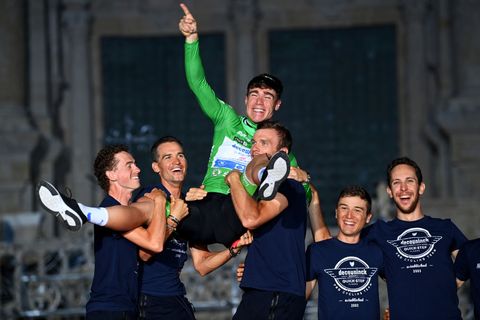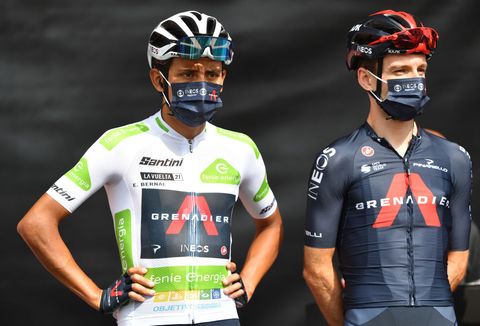Vuelta Winners
Fabio Jakobsen (Deceuninck-Quick Step): Jakobsen won two stages at the 2019 Vuelta but missed last year’s race after a violent crash in August’s Tour of Poland left the Dutchman in a medically-induced coma and facing a long road to recovery that included multiple reconstructive surgeries to repair damages to his face and jaw. Well, after winning three stages and the green jersey as the winner of the Vuelta’s Points Classification, it’s safe to say the 25-year-old is fully healed—physically and mentally.
The success couldn’t have come at a better time, as Quick Step General Manager Patrick Lefevere is down two sprinters thanks to the upcoming departures of Sam Bennett and Alvaro Hodeg. Even worse, a contract extension with Mark Cavendish has been slow to materialise, which means Jakobsen could find himself leading the team’s sprint train at the Tour de France next July, something that hardly seemed possible this time last year.
Team DSM: Prior to starting the La Vuelta, Team DSM had been suffering through a terrible season, winning only five races, the best of which was Stage 2 of Paris-Nice way back in March. But the team redeemed itself, taking three stage wins and the polka dot jersey as winner of the race’s King of the Mountains competition. Australia’s Michael Storer led the way, with two stages and the KOM title, but France’s Romain Bardet, a former Tour de France podium finisher who joined the team this past offseason, won a mountain stage and wore the polka dot jersey himself before relinquishing it to Storer on Stage 18.
This has always been a scrappy team that finds the most success when its riders prove willing to put the team before themselves. Storer’s development (he also won the Tour de l’Ain earlier in the summer) and Bardet’s renaissance bode well for the team in 2022, when we could see both riders line-up at the Tour de France.
Magnus Cort (EF Education First-Nippo): Cort won three stages for EF Education-Nippo, and almost took two more with a third-place finish on Stage 3 and second-place on Stage 21 (in La Vuelta’s final freakin’ time trial). Clearly in the form of his life—and with a killer moustache to boot—the Dane stepped in to fill the void left once Hugh Carthy (who finished third overall last year) abandoned on Stage 7. Capable of winning on all kinds of terrain, Cort’s the perfect rider to have on a grand tour squad, and he showed why over the past three weeks. No wonder the team extended his contract in late-May.
Bahrain-Victorious: As much as it pains us to say given the rumours surrounding the team’s sudden and somewhat unexpected rise to prominence this season, Bahrain-Victorious enjoyed another successful grand tour, winning a stage (Italy’s Damiano Caruso took Stage 9), the white jersey as La Vuelta’s Best Young Rider (Switzerland’s Gino Mäder), the Teams Classification, and placing riders in third- and fifth-place overall (Australia’s Jack Haig and Mäder, respectively).
The team once again rebounded after the squad’s pre-race captain, Spain’s Mikel Landa, came up short, abandoning the race on Stage 17. (Landa crashed out of May’s Giro d’Italia on Stage 5, leaving Caruso to lead the team.) In Haig, the team might really have something, the 28-year-old has been quietly developing into a grand tour contender, which he confirmed with his podium finish in Spain. Look for the Aussie to get another shot at leading the team at next year’s Tour de France; he was riding well in this year’s race before crashing out at the end of Stage 3.
Alpecin-Fenix and Intermarché-Wanty-Gobert Matériaux: This was the first Tour of Spain for these two Belgian squads and together they performed better than about half of the other teams in this year’s race. Alpecin took two stage wins with Jasper Philipsen, and Intermarché won a stage and spent nine days in the red jersey worn by the Vuelta’s overall leader. That’s pretty good for one team riding without its superstar (Alpecin’s Mathieu van der Poel) and another without anything close to a superstar on its entire roster (Intermarché).
Vuelta Losers
INEOS Grenadiers: When you come to a grand tour with Egan Bernal, Richard Carapaz, Adam Yates, and one of the best groups of support riders in the world, you expect to win. That’s why fourth- and sixth-place overall finishes (and zero stage victories) doesn’t cut it for the British superteam. Yes, Roglič was a one-man wrecking ball who would have been tough for anyone to defeat, but INEOS never looked as if it was really in contention. The team lacked cohesion during the first week, which made it hard for the squad’s three co-leaders to overcome the time they lost to Roglič in the opening time trial. And when the mountains came, they faltered.
Bernal seemed unable to rise to the occasion (despite several days in which his attacks reminded us of the rider who won May’s Giro d’Italia), Carapaz proved to be too tired from his third-place finish in the Tour de France and gold medal-winning ride in the Olympic road race (he abandoned the race on Stage 14), and Yates seemed to be confused as to whether he was his team’s captain or its No. 1 super-domestique. Overall this season, INEOS won the Giro, finished third at the Tour, and now took fourth and sixth at the Vuelta. For many teams, that’s a banner year, but for INEOS, it’s just okay.
Spain: Aside from Enric Mas’s (Movistar) second-place finish, there was little for the home fans to cheer about this year. Spanish riders won no stages or jerseys, and the nation’s most well-known contenders—Landa and Alejandro Valverde (Movistar)—abandoned the race. And while Mas’s fourth top-10 grand tour finish in the last two seasons (and the second runner-up finish at the Vuelta of his career) gives reason for optimism, Mas did little more than follow wheels throughout the entire race. If and when he attacked, he gained handfuls of seconds and rarely put his rivals in serious difficulty. That’s hard to get excited about.
And just when it looked like Movistar was about to end the race with two riders on the final podium, Colombia’s Miguel Ángel López imploded on the penultimate day, leaving the race entirely and putting a damper on what looked to have been the team’s best grand tour since it won the Giro with Richard Carapaz in 2019. Ugh.
Miguel Ángel López (Movistar): López won the Vuelta’s hardest stage (Stage 18) and was sitting in third-place overall heading into the final weekend. But after missing the move on Stage 20 and watching his hopes of podium finish disappear up the road, the Colombian chose to abandon the race entirely, stepping into his team car despite being encouraged (if not ordered) to carry-on by his directors. The Colombian is clearly talented, but his inability to finish out a big race has to be a concern for Movistar, especially since the team added two years to his contract prior to the start of the Vuelta. The smart move would be to let López lead the team himself at next year’s Giro d’Italia, as he’s clearly not able to handle the pressure that comes with sharing leadership responsibilities with a teammate.
Astana-Premier Tech: Astana came to the race hoping for a podium finish from Russia’s Aleksandr Vlasov, but left it without Vlasov (he abandoned prior to Stage 20), no stage wins, and with it’s best riders in 26th- and 27th-place overall. Even more embarrassingly, the team announced prior to the race that Premier Tech (a Canadian company) would be ending its partnership with the team and during the race that Alexandre Vinokourov, who was dismissed from his duties as the team’s General Manager prior to the start of the Tour de France, was coming back to run the squad.
Given Vino’s “colourful” past and rumours that have circulated in recent years about unpaid salaries for riders and staff and frantic searches for new sponsors, we can’t blame Premier Tech for leaving—and many of the team’s better riders as well.
Mikel Landa (Bahrain-Victorious): This has been a lost season for Landa, who blamed his poor showing and subsequent DNF on not being fully recovered from his crash at May’s Giro d’Italia. Landa’s still only 31 and he scored top-10 finishes at the Tour de France from 2017 through 2020, but for a rider whose contract has expired with a team who seems to have a wealth of talented riders, two grand tour DNFs couldn’t have come at a worse time.





